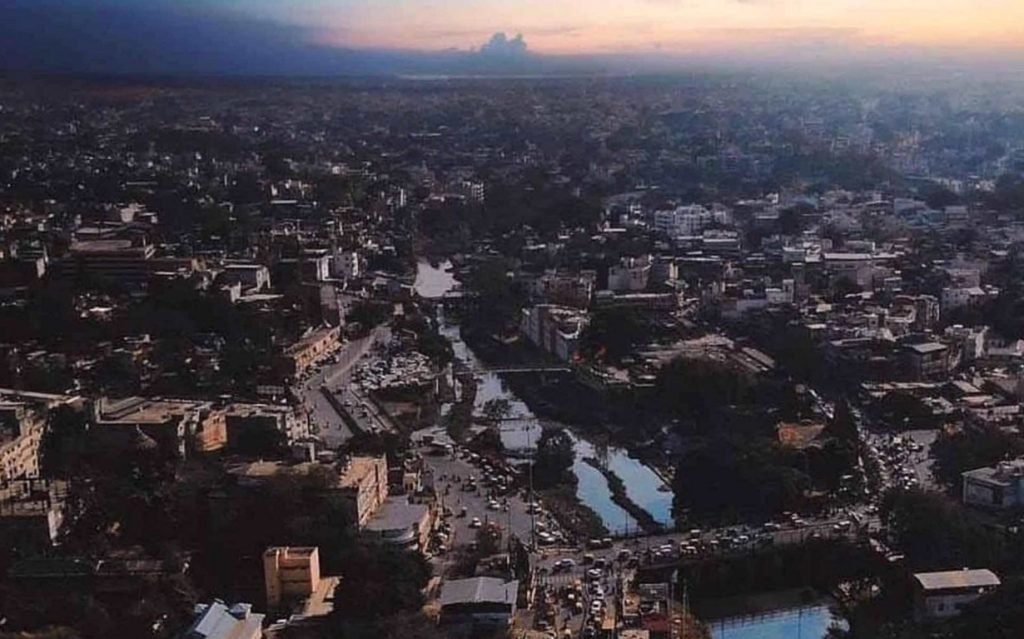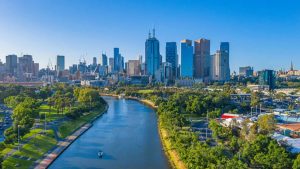
The Cleanest City In India Needs Circular Economy: Can Indore Truly Become A Smart City?
Indore generates over 1,115 Mega Tonnes of garbage a day, which is expected to escalate to 2000 Mega Tonnes in another decade, which is about 38 times the Great Wall of China.
Indore is the most populous city in Madhya Pradesh with 3 million residents, increasing at an alarming rate of 3.64% annually. Out of this, 2.31 lakh (7.7% of the entire population) residents live without a sewer system, while another 30% are in dire need of repairs.
Emerging as a major industrial centre, it has an estimated GDP of $35 billion in 2019. Its industries are mainly cotton textiles, iron and steel, chemicals and machinery, most of which are responsible for pollution of the Kahn river, as well as contamination of drinking water.
Map of Indore (Google maps)
INDORE’S WATER WOES
- As per a 2017 report, more than 20% of sewage waste is dumped untreated into Indore’s water supply, while 80% of its sewers are under-utilized or blocked.
- Due to lack of regulation and capacity, a large portion of untreated sewage is disposed of in the Kahn river, thereby increasing concentrations of harmful, Coliform Bacteria.
- Due to clogging, sewage networks overflow and disperse along the streets, leading to adverse health effects such as diarrhoea, typhoid and malaria.
Villagers waiting for water in Madhya Pradesh (IndiaToday)
- Despite receiving an annual average of 1062 mm, Indore regularly suffers water scarcity issues during the summer. This is primarily due to lack of groundwater recharge mechanisms, while increased rainfall density results in high runoff.
- Ground water in the Indore region has high salinity and nitrate contamination due to its primitive and dilapidated sewer system, and lack of proper water treatment.
- The frequency droughts have increased during the last few decades. About 40% of its bore wells dry out before the monsoon. 38% of Indore’s population resides in slums, without access to a water supply network, since the residents depend solely on bore wells and occasional visits from water tankers.
Appallingly, Indore’s water supply is only able to serve 46% of its population.
FALLING SHORT
Indore ranks as the most polluted city in Madhya Pradesh. Some major issues faced by the city are as follows:
- BIOMEDICAL WASTE
- Indore makes 3 tonnes of biomedical waste daily.
- The study by Central Pollution Control Board Bhopal on veterinary hospitals and institutes revealed that 80% of biomedical waste is disposed of with the municipal waste or burnt in public, causing threat to human life.
- A field survey reported poor waste management, transportation, and unscientific disposal methods, a cause of zoonotic diseases, which is a disease or infection that is transmissible from animals to humans.
Change in maximum and minimum temperatures in the period 1951-2013 ( IIM Ahmedabad)
- FOREST COVER
- Up until 2015, Madhya Pradesh had a shrinking forest cover.
- The FSI, which conducts survey of forests every two years has reported sharp decline in dense forest areas of Indore and several other districts.
- Between 2015 and 2017, the state is said to have lost 48 sq km (11,861 acres) of forest land and total forest area shrunk from 77, 462 to 77,414 sq km.
- The loss of forest cover has been attributed to expansion of agricultural activities, illegal deforestation, encroachment, excessive mining, rapid urbanization and industrialization in cities like Indore, Bhopal and Jabalpur.
In a study conducted in 2016, it was predicted that Indore’s annual temperature could go up by as much as 2 degrees by mid-century in the highest emission pathways.
THE CITY THAT SAVED ITSELF
Despite all these shortcomings, Indore is actually a step ahead of most Indian cities on the road to Sustainability.
Since 2016, the IMC, Indore Municipal Corporation has managed to achieve 100% household-waste segregation, eliminated garbage dumps, and converted waste to usable products.
It partnered with NGOs and private companies for an awareness campaign to change the behaviour of its citizens, and to run waste management operations.
COMMUNITY INITIATIVES : ROLE OF THE IMC, NGOS AND PRIVATE COMPANIES
IMC’s trash collector van (indiaspend)
In 2016, the IMC started collecting waste everyday from households. They also asked people to segregate their waste into dry and wet
The waste processing facility sifts through 645 tonnes of recyclable waste every day. 550 tonnes of organic waste converted into compost daily.
- The recyclable waste is sold to either the recycling industry or to companies that use recycled material.
- Non-recyclable waste is sent to a cement plant at Neemuch and to the M.P. Rural Road Development Corporation.
- Construction waste is sent to a separate privately-operated facility, where it is used as raw material for making bricks and paver tiles.
- The compost is sold to farmers and landscapers as manure, and sometimes given for free, thereby returning the resources back to the circular economy.
Sarthak and Basix, two NGOs, have further integrated the informal sector to sort waste. NGOs also explain to people why waste segregation was important.
Chappan Dukaan (tripadvisor)
- All food outlets in Chappan Dukan, separate food waste and deposit it at a nearby location, from where Swaha, the NGO manages the composting. The amount of food waste generated is recorded, for revenue as well as to reduce future wastage for food owners.
- About 20 tonnes of waste is collected every day, and converted into 750-800 kg of bio compressed natural gas (bioCNG) by Mahindra Waste to Energy Solutions.
The gas produced is used to run city buses, and sold as cooking fuel to hotels.
According to Swachh Survekshan, the annual survey under Swachh Bharat Abhiyan, Indore has been ranked India’s cleanest city four years in a row, having managed around 90% of its solid waste challenge.
CSR INTERVENTIONS
In 2018, Hero Motocorp, in collaboration with Sustainable Green Initiative, Greenmax, Leicht- Led Private Limited, and SPECS spent INR 26.44 crore on Environmental Sustainability in cities across India, including Indore. The activities included :
- Large scale afforestation,
- Water conservation,
- Banning single use plastic in its premises,
- Installation of LEDs and solar street lights.
SOLUTIONS : LOCALIZING THE ISSUE
Reusing plastic bottles for plantation (istockphotos)
The easiest way local citizens can contribute to the circular economy is by educating themselves about sustainable methods, such as:
- Waste disposal and segregation
- Reuse/Recycle of plastic by products : Such as reuse in plantation, see Earth5R’s initiatives, and waste segregation.
- E-waste disposal : Making use of e-waste collection centres in Indore
If the solution is not local, it is not sustainable.
- Indore forest department officials say that the people of Indore have become aware and keep them informed of fires or crimes committed in forest areas.
- 95% of households in Indore give segregated waste to the collectors.
- Indore earns 4 crore annually with proper waste management.
This is what makes it a role model for cities all over India.
WHAT IS A CIRCULAR ECONOMY?
A circular economy is an economic system of closed loops in which raw materials, components and products lose minimum value, renewable energy sources are used and systems thinking is at the core.
A linear vs circular business model (Source: kenniskaarten.hetgroenebrein)
Reduce, Reuse, and Recycle are at the core of this economy. What enters the system, stays in the system for as long as possible.
In the context of Indore, several instances of circular initiatives by the administration as well as the residents can be observed.
HOW WILL IT BENEFIT US?
The ecological benefits of a circular economy:
- Less greenhouse gases
- Vital soil, air and water bodies
- Conservation of nature reserves
It is estimated that adopting a circular economy path could bring India annual benefits of ₹40 lakh crores by 2050. The greenhouse emission would reduce by 44% along with a significant reduction in congestion and pollution.
HOW CAN A CIRCULAR ECONOMY SOLVE INDORE’S PROBLEMS?
The UN spotlights findings showed that nature-based solutions, such as rainwater harvesting, forest regeneration are becoming increasingly important to solve the global water crisis.
Accordingly, Indore should focus on these solutions to improve water scarcity situations during the dry seasons. Luckily, since 2015, Madhya Pradesh has been seeing a steady rise in forest cover and is now aiming for the national target of 33%.
In addition, treatment of sewage is also highly important. Water utilities have the potential to become the engines of the circular economy.
Water in a Circular Economy (Nextgenwater)
Sustainable textile industry practices will also be useful to Indore owing to its large textile industry by reselling and recycling old clothing.
(Ellen McArthur Foundation)
EARTH5R’S CIRCULAR ECONOMY INITIATIVES
The Earth5R team installed a composting unit at ‘Parvati Heritage’ society in Ghatkopar. (Earth5R)
- During the training the residents were informed about the 3 broad types of waste generated in household – recyclable, biodegradable, and refuse which mainly include medical and sanitary waste.
- The residents were thoroughly trained on correctly identifying these waste streams.
- Segregation of these waste streams was addressed, by emphasizing the significance of segregating the waste at the source level
- The residents were given a live demonstration of the working of the composting unit.
Reach out to Earth5R to know more about solving environmental issues by creating circular economy based sustainability projects.
ABOUT EARTH5R
Earth5R is an environmental organization from India with its head office at Mumbai. It works with the NGO sector, Companies and helps them conduct environmental corporate social responsibility (CSR) programs across India. Earth5R specializes in circular economy-based projects. Earth5R also offers short term and long-term environmental courses.
Earth5R’s Global Sustainability Hub is a cross-sector and cross-country collaboration in pursuit of UN Sustainable Development Goals. It is an excellent opportunity for governments and the private sector to engage with communities, use Sustainability-based models to drive economic changes and create social and environmental impact.
Reported by Ankita Nambiar, edited by Aastha Dewan




